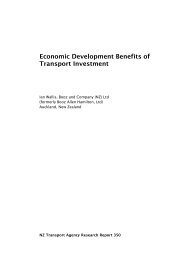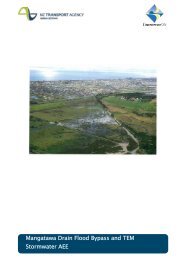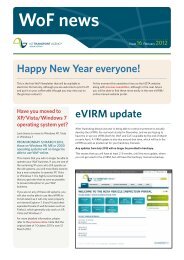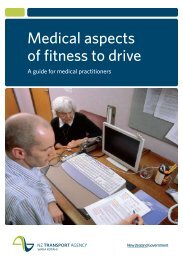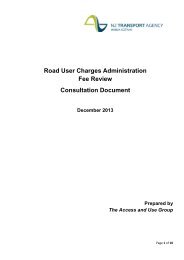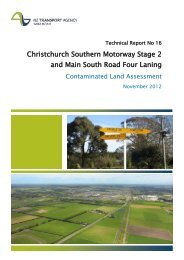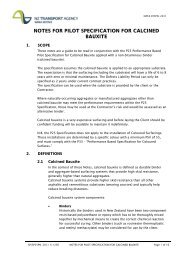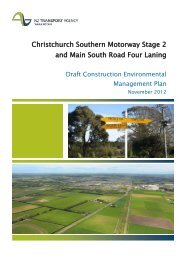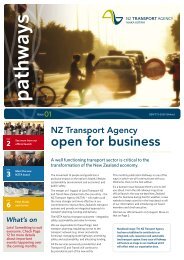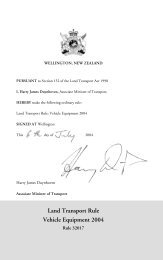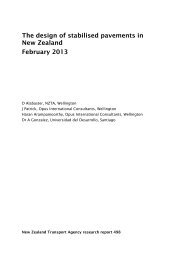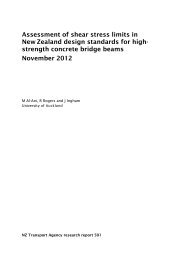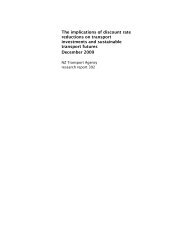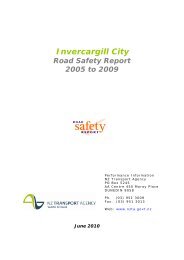Cycle network and route planning guide - NZ Transport Agency
Cycle network and route planning guide - NZ Transport Agency
Cycle network and route planning guide - NZ Transport Agency
You also want an ePaper? Increase the reach of your titles
YUMPU automatically turns print PDFs into web optimized ePapers that Google loves.
Broader objectives include:<br />
• creating an integrated mix of<br />
transport modes<br />
• protecting <strong>and</strong> promoting public health<br />
• assisting safety <strong>and</strong> personal security<br />
• enhancing economic, social <strong>and</strong><br />
environmental wellbeing<br />
• ensuring environmental sustainability<br />
• improving access <strong>and</strong> mobility, including<br />
walking <strong>and</strong> cycling.<br />
Promoting walking <strong>and</strong> cycling is<br />
recognised as one of five priority areas<br />
because of its contribution to the strategy’s<br />
vision <strong>and</strong> objectives. This priority is<br />
now enshrined in the L<strong>and</strong> <strong>Transport</strong><br />
Management Act 2003, so Transfund<br />
New Zeal<strong>and</strong> now funds the promotion<br />
of walking <strong>and</strong> cycling in a separate<br />
output class.<br />
2.4.1 National walking <strong>and</strong><br />
cycling strategy<br />
The draft walking <strong>and</strong> cycling strategy<br />
Getting there — on foot, by cycle<br />
(October 2003, expected to be finalised<br />
during 2004) provides more details.<br />
It articulates a vision of: A New Zeal<strong>and</strong><br />
where people from all sectors of the<br />
community choose to walk <strong>and</strong> cycle<br />
for transport <strong>and</strong> enjoyment — helping<br />
ensure a healthier population, more lively<br />
<strong>and</strong> connected communities, <strong>and</strong> a more<br />
affordable, integrated, safe, responsive <strong>and</strong><br />
sustainable transport system.<br />
It sets out a wide range of actions that<br />
would make cycling a more attractive<br />
mode of travel. Priorities relevant to cycle<br />
<strong>planning</strong> include:<br />
• exp<strong>and</strong> our knowledge <strong>and</strong> skill base<br />
to address walking <strong>and</strong> cycling<br />
• encourage <strong>planning</strong>, development <strong>and</strong><br />
design that support walking <strong>and</strong> cycling<br />
• provide supportive environments<br />
for walking <strong>and</strong> cycling in existing<br />
communities<br />
• improve <strong>network</strong>s for long-distance<br />
cycling<br />
• address crime <strong>and</strong> personal security<br />
concerns around walking <strong>and</strong> cycling<br />
• improve road safety for pedestrians<br />
<strong>and</strong> cyclists.<br />
The LTSA is preparing a Pedestrian <strong>and</strong><br />
cyclist safety framework, which addresses<br />
safety issues.<br />
2.5 Regional l<strong>and</strong><br />
transport strategies<br />
Each regional council is required to develop<br />
a regional l<strong>and</strong> transport strategy (RLTS)<br />
with help from a regional l<strong>and</strong> transport<br />
committee (RLTC). RLTCs are required by<br />
law to represent a range of road users, <strong>and</strong><br />
some now include cycling representatives.<br />
Although regional councils do not directly<br />
manage the roads, all projects in their<br />
regions must take RLTSs into account.<br />
RLTSs also carry weight in Transfund<br />
New Zeal<strong>and</strong>’s decisions on funding RCA<br />
projects <strong>and</strong> packages.<br />
Some regional councils have supplemented<br />
their RLTS with a regional cycling strategy.<br />
A New Zeal<strong>and</strong> where people from all sectors of the<br />
community choose to walk <strong>and</strong> cycle for transport <strong>and</strong><br />
enjoyment — helping ensure a healthier population,<br />
more lively <strong>and</strong> connected communities, <strong>and</strong> a more<br />
affordable, integrated, safe, responsive <strong>and</strong> sustainable<br />
transport system.<br />
2.6 Road controlling<br />
authorities<br />
RCAs have direct responsibility for the<br />
road system. They usually own the roads<br />
<strong>and</strong> public paths, <strong>and</strong> (often through<br />
contractors) construct, improve <strong>and</strong><br />
maintain them. RCAs have powers to<br />
regulate road users’ behaviour, for example<br />
by banning parking, creating one-way<br />
streets <strong>and</strong> installing traffic signals.<br />
As well as being a local authority, every<br />
city <strong>and</strong> district council is an RCA <strong>and</strong><br />
Transit New Zeal<strong>and</strong> is the RCA for state<br />
highways. In some areas local authorities<br />
manage state highways on Transit<br />
New Zeal<strong>and</strong>’s behalf (for example,<br />
Rotorua <strong>and</strong> Marlborough).<br />
2.7 Other<br />
local council<br />
responsibilities<br />
Local councils have other roles, besides that<br />
of RCA, that affect transport <strong>and</strong> cycling.<br />
2.7.1 Resource Management<br />
Act 1991<br />
Under the Resource Management Act 1991,<br />
councils prepare district plans <strong>and</strong> regional<br />
councils regional plans. Both types of plan<br />
include rules regulating what may or may<br />
not happen.<br />
2.7.2 Reserves Act 1977<br />
Under the Reserves Act 1977, local councils<br />
are responsible for managing various types<br />
of reserve l<strong>and</strong>.<br />
Off-road cycle paths are often located on<br />
recreation reserves. Councils may allow<br />
for these in their relevant reserve<br />
management plans.<br />
2.7.3 Local Government<br />
Act 2002<br />
The main Act governing local councils’<br />
activities is the Local Government Act 2002,<br />
which includes the power to declare a<br />
path a cycle track. Under the Act, councils<br />
prepare <strong>and</strong> consult on annual plans setting<br />
out proposed spending during the coming<br />
year, <strong>and</strong> long term council community<br />
plans (LTCCPs) outlining spending over<br />
the forthcoming 10 years. The public<br />
submission processes of these plans may<br />
be used to argue for spending on provision<br />
for cyclists.<br />
2.8 Integrated<br />
transport <strong>planning</strong><br />
Integrated transport <strong>planning</strong> aims<br />
to embrace a range of perspectives<br />
traditionally covered separately, including:<br />
• a variety of forms of transport<br />
(for example car, bus/rail, cycling<br />
<strong>and</strong> walking)<br />
• the relationships between transport<br />
<strong>and</strong> l<strong>and</strong> use<br />
• the contribution transport makes to<br />
other economic, social, health <strong>and</strong><br />
environmental objectives.<br />
This type of <strong>planning</strong> may become<br />
more significant in light of Transfund<br />
New Zeal<strong>and</strong>’s Allocation Process Review<br />
(2003/2004) which encourages integrated<br />
proposals. Cycling should be integrated into<br />
all transport <strong>planning</strong>.<br />
2.9 Other<br />
government<br />
strategies<br />
Actions to promote cycling are implied<br />
under other strategies as well, such as<br />
those covering energy efficiency, urban<br />
design <strong>and</strong> form, preventive health <strong>and</strong><br />
environmental protection. Non-transport<br />
agencies such as the Energy Efficiency <strong>and</strong><br />
Conservation Authority (EECA) <strong>and</strong> Sport<br />
<strong>and</strong> Recreation New Zeal<strong>and</strong> (SPARC) have<br />
sometimes taken the lead in significant<br />
cycling promotion initiatives. These include<br />
EECA’s support for school travel plans,<br />
projects <strong>and</strong> organisations, <strong>and</strong> SPARC’s<br />
cycle-friendly employer schemes.<br />
11



